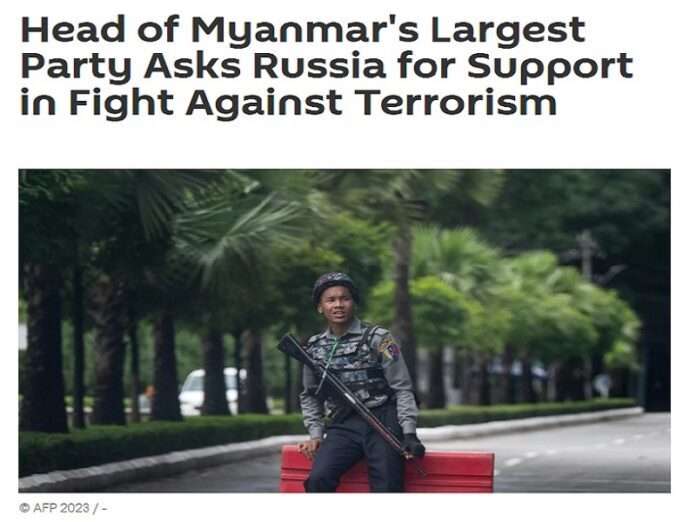Sputnik reported that the head of Myanmar’s largest party called on Russia to provide their country with assistance in waging its war on terror, which is what it describes the latest phase of its decades-long civil war that began after the military intervened in the aftermath of late 2020’s disputed elections. This coincides with reports that the rebel alliance is on the verge of seizing the strategic garrison town of Lashio, which is the seat of the Northeastern Military Command. Here are some background briefings:
* 8 February: “Myanmar’s Three-Year-Long Conflict Isn’t As Simple As It Seems At First Glance”
* 23 February: “America Is Preconditioning The Public For More Meddling In Myanmar”
* 5 March: “American Meddling Could Disrupt Myanmar’s Fragile Chinese-Mediated Peace Process”
* 18 March: “Myanmar’s Rebels & Their Foreign Supporters Really Dislike Thailand’s Four-Point Plan”
* 28 March: “TASS’ Interview With Myanmar’s Leader Had An Interesting Connectivity Tidbit”
* 5 April: “The West Is Returning To The Rohingya Issue In An Attempt To Divide & Rule This Part Of Asia”
* 27 May: “Bangladesh Warned About A Western Plot To Carve Out A Christian Proxy State In The Region”
* 2 June: “There’s A New Coordinated Push For More Western Meddling In Myanmar”
In short, the armed forces (locally known as the Tatmadaw) have been on the backfoot since the rebel alliance’s nationwide offensive last fall, though the conflict’s complexity means that it’s inaccurate to oversimplify this as an entirely US-backed regime change operation and/or a war on terrorism. Nevertheless, there are indeed distinct elements of both, and the Russian state supports its Myanmarese counterpart’s depiction of the crisis in those aforementioned ways.
That being the case, there’s a chance that Russia might provide more meaningful anti-terrorist assistance to Myanmar than simply the arms shipments that it’s been sending the Tatmadaw, though it’s means are limited. Not only is the special operation still Russia’s top military-strategic priority, but its rebranded Wagner forces in Mali just suffered a devastating defeat at the hands of Tuareg rebels that are thought to be supported by the West, Ukraine, and Islamists. Readers can learn more about that here.
This development turned the local Tuareg Conflict into another New Cold War proxy war, one that Russia hadn’t hitherto expected to fight. It’s now recalibrating its perceptions of that conflict and adjusting its tactics accordingly, but it’ll also be worried about whether any more seemingly local foreign military engagements might also turn into new proxy wars. Myanmar’s conflict is already considered to be part of this global struggle so it’s not surprising that Moscow might be hesitant about becoming embroiled in it.
Even if it has more high-tech equipment to spare, as well as Wagner fighters to send there for handling them and advising their Tatmadaw hosts, it’s unrealistic to expect that this would be a game-changer. Whatever is dispatched to Myanmar can’t take away from Russia’s immediate military-strategic needs in Eastern Europe and its newly emergent secondary ones in West Africa, not to mention whatever
systems it might be speculatively sending to Iran ahead of its promised retaliation against Israel.
This insight reinforces the notion that Russia has limited means even if it wanted to get directly involved through Wagner, while that group can’t be expected to turn the tide of this conflict when it took a while to stabilize the Central African Republic and Mali is still a work in progress. Those countries’ conflicts are considered less intense than Myanmar’s, which is a hybrid conventional-unconventional one, so it therefore follows that whatever assistance Russia might provide wouldn’t make any major difference.
It would certainly help, and some might ultimately be sent there to assist with fortifying the front lines in order to give the Tatmadaw time to plan a counteroffensive, but nobody should have any illusions about these limited means resulting in any significant changes on the ground right away. At most, some limited victories could occur if Wagner puts its drone and heavy weapons expertise to use, but the battlefield might be too different from what its fighters are used to and thus reduce their overall effectiveness.
All told, Russia can ill-afford to stretch its already limited military-strategic resources by becoming embroiled in another New Cold War proxy war, this time on the other side of Asia after unexpectedly being forced to fight one all the way in West Africa. The special operation remains Russia’s top priority, but it’ll still help its partners however it’s able to within its limited means, but none of them should get their hopes up that this would be a game-changer in their respective Hybrid Wars.







